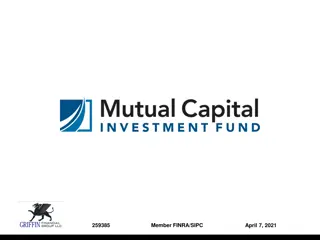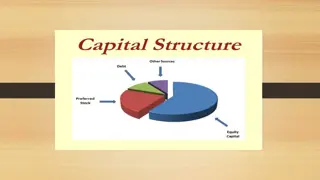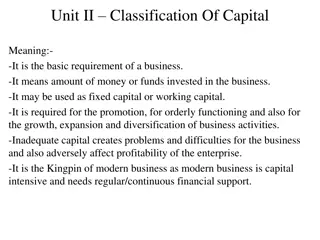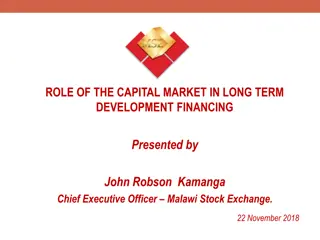Understanding the Significance of Capital Market in Finance
Capital Market plays a crucial role in facilitating long-term finance for companies and governments, offering avenues for investors, promoting economic growth, and ensuring stability in securities. It encompasses functions like fund mobilization, capital formation, and technological advancement. With classifications into industrial securities, government securities, and long-term loans, the market supports productive use of savings, capital formation, and investment opportunities.
Download Presentation

Please find below an Image/Link to download the presentation.
The content on the website is provided AS IS for your information and personal use only. It may not be sold, licensed, or shared on other websites without obtaining consent from the author. Download presentation by click this link. If you encounter any issues during the download, it is possible that the publisher has removed the file from their server.
E N D
Presentation Transcript
CAPITAL MARKET Capital Market refers to the market for long term finance. Financial assets which have a long or indefinite maturity period like Shares, Debentures, Bonds, etc., are dealt in this market. It includes all the facilities and the institutional arrangements for borrowing long-term funds by private sector industries and the government for the purpose of manufacturing and development activities.
FUNCTIONS OF CAPITAL MARKET The main functions of capital market include the following 1. Mobilization of long term funds for the companies for manufacturing and service activities. 2. Raising of long term funds for the government for undertaking various development activities.
SIGNIFICANCE / ADVANTAGES / IMPORTANCE OF CAPITAL MARKET 1. Very important avenue for investors 2. Productive use of the economy s savings 3. Facilitate capital formation 4. Offer reasonable rate of return on savings 5. Facilitate production and productivity 6. Induce economic growth 7. Promotion of stability in values of securities 8. Facilitate technological up-gradation
CLASSIFICATION OF CAPITAL MARKET The Capital market is further classified into the following three: a) Industrial Securities Market b) Government Securities Market c) Long-term Loans Market
INDUSTRIAL SECURITIES MARKET The financial market where industrial securities like equity shares, preference shares, debentures, bonds, etc., are dealt with is called as Industrial Securities Market. In this market, the industrial concerns raise their capital and debts by issuing appropriate securities. This market is again classified into two viz., Primary Market and Secondary Market.
GOVERNMENT SECURITIES MARKET OR GILT-EDGED SECURITIES MARKET The financial market where Government securities like stock certificates, promissory notes, bearer bonds, treasury bills, etc., are dealt with is called as Government Securities Market. The long term securities issued by the Central Government, State Governments, Semi-government authorities like City Corporations, Port Trusts, etc., Improvement Trusts, State Electricity Boards, All India and State level financial institutes and public sector enterprises are bought and sold in this market.
FEATURES OF GOVERNMENT SECURITIES 1. Government securities are issued in denominations of Rs. 100 2. Interest on these is payable half yearly 3. They carry tax exemptions 4. Generally the commercial banks buy these securities to comply with SLR requirements 5. Long term securities are sold through the Public Debt Office of the RBI and the Treasury bills are sold through auctions 6. They offer a good source of less expensive finance for the Government. 7. Their value never diminishes and hence they are also called as Gilt-edged Securities.
LONG-TERM LOANS MARKET The financial market where long-term loans are provided to the corporate customers is called as Long-term Loans Market. Development Banks and Commercial Banks play a major role in this market. This market is classified into three viz., Term loans market, Mortgages market and Financial guarantees market. Term loans market - This market consists of the industrial financing institutions which supply long term loan to corporate customers. They are created by the Government both at the national level and regional level. They provide term loans to corporate customers and also help them in identifying investment opportunities. They also encourage new entrepreneurs and support modernization efforts. IDBI, IFCI, ICICI, SFCs, etc., come under this market. Mortgages market - This market consists of the institutions which supply mortgage loan mainly to individuals. The term mortgage refers to the transfer of interest in a specific immovable property to secure a loan.
Financial guarantee market - This market consists of the institutions which provide financial guarantee to individuals and corporate customers. The term guarantee refers to a contract whereby one person promises another person to discharge the liability of a third person in case of his default. There are different types of guarantees prominent among them are Performance guarantee and Financial guarantee. The financial guarantee is related to deferred payments for imports and exports, loans raised overseas, loans advanced by bank and other financial institutions, etc. These guarantees are provided mainly by commercial banks, development banks, specialized guarantee institutions like Export Credit Guarantee Corporation, Deposit Insurance and Credit Guarantee Corporation, etc.
MAJOR PARTICIPANTS OF CAPITAL MARKET Following are the important participants of capital market. 1. Development Financial Institutions like IFCI, ICICI, IDBI, UTI, etc., 2. Insurance Companies like LIC, GIC, etc., 3. Commercial Banks like SBI, SBM, Canara Bank, Syndicate Bank, etc., 4. Provident Funds like SPF, RPF, PPF, etc., 5. Others like Merchant Bankers, Leasing Companies, Venture Capital Companies, etc























